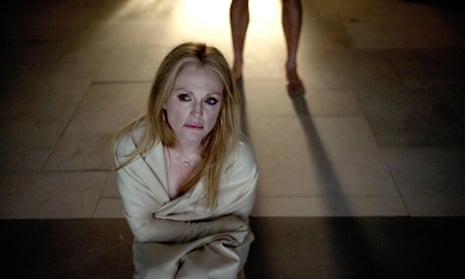David Cronenberg’s Maps to the Stars is a macabre ensemble comedy of cruelty, insecurity and self-hate, written for the screen by Bruce Wagner and premiered at Cannes. It looks even more exquisitely horrible on a second viewing: a satire of contemporary Hollywood, with echoes of Sunset Boulevard and Postcards from the Edge, depicting a communal nervous breakdown in a town so enclosed and incestuous that everyone is part of the same symbolic sibling-hood of fear. This is one, big, unhappy dysfunctional family, in which guilty souls are afraid of failure and haunted by the return of the repressed. Every surface has a sickly sheen of anxiety; every face is a mask of suppressed pain. It is a further refinement of this director’s gifts for body horror and satire. Julianne Moore plays Havana Segrand, a neurotic failing movie star in a permanent toxic state of career panic. Taking her self-esteem to a new low, she is auditioning for a remake of a 50s melodrama starring her late movie-star mother Clarice – whom she now believes abused her, thanks to sessions with creepy new-age therapist Stafford (John Cusack). Clarice’s film is, evidently, a melodrama in the style of Suddenly, Last Summer, with Elizabeth Taylor. Stafford’s 13-year-old son, Benjie (Evan Bird), is a bratty child star with a secret connection to Havana’s troubled “chore whore”, or personal assistant, Agatha (Mia Wasikowska), who has befriended limo driver Jerome (Robert Pattinson). The assistant is the ultimate Hollywood figure, part of the emotional sewerage – they are the untrusted servants who must masochistically absorb all the toxic abuse dumped on them in return for an unspoken promise that maybe, one day, they will get an audition, or their screenplay will be picked up. It is a brilliant Jacobean nightmare; the kind of thing John Webster might write if he was living in the 21st century.
David Cronenberg: Hollywood actors are ‘desperate to assert their existence’






Comments (…)
Sign in or create your Guardian account to join the discussion